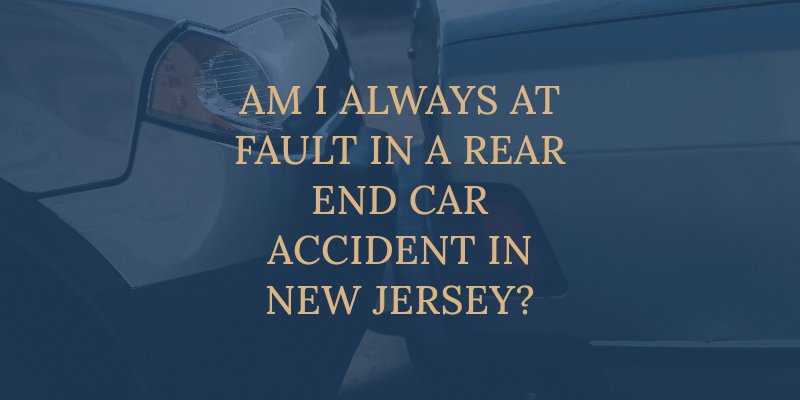Am I Always at Fault in a Rear-End Car Accident in New Jersey?

Rear-end collisions are a type of car accident commonly seen on roads and highways in New Jersey. The rear driver in a rear-end collision is often presumed to be at fault for the accident, as it is this driver’s responsibility to maintain a safe following distance. However, fault can shift to the front driver in certain circumstances. That’s why it’s so important to speak with an experienced car accident lawyer in New Jersey.
When Does Liability Matter in a Rear-End Collision in New Jersey?
First, it is important to recognize that New Jersey is a no-fault state. Fault for a rear-end collision might not matter if you have a basic insurance policy or a standard policy with limited right-to-sue insurance. In these situations, you will file a claim with your own car insurance company, even if you believe that the other driver is at fault.
If your type of insurance policy or the severity of your injuries permits you to file a claim against another driver outside of New Jersey’s no-fault law, this is when you will need to determine and prove fault for a rear-end collision to recover compensation.
How Is Fault Determined After a Rear-End Car Accident?
If you were the rear driver in a rear-end collision in New Jersey, you can expect the other driver’s insurance company to try to blame you for the accident. This is the assumption because of New Jersey’s roadway rule that requires motorists not to follow each other too closely.
Drivers must maintain a following distance that is safe based on road, weather and traffic conditions. This distance must be enough to allow the driver to brake and come to a stop if the car ahead suddenly slows.
Because of this law, liability almost always goes to the rear vehicle in a rear-end car accident case. However, there are exceptions to this general rule. An investigation may be required to determine fault and allocate a percentage of liability to either party.
When Is the Front Driver Held Responsible for a Rear-End Collision?
There are traffic and driving situations that can result in the front driver being held responsible for causing a rear-end collision in New Jersey. Although this is less common than fault going to the rear driver, it could be the case in the following circumstances:
- Brake-checking. If the front driver is guilty of the reckless behavior of brake-checking, or slamming unexpectedly on the brakes for the sole purpose of sending a message to the rear driver, this aggressive driving practice can make the front driver liable for a crash.
- Unsafe lane changes. A rear driver may not have time to brake to avoid a collision if the front driver cuts him or her off in an unsafe lane change maneuver. Before switching lanes, a driver must ensure that there is enough room between vehicles in the destination lane.
- Vehicle defects. Drivers rely on visual signals to tell when another vehicle is slowing down or stopping. If a vehicle has a defect, such as broken brake lights, the driver of that car could be held responsible for a related rear-end collision.
As these exceptions prove, no driver is automatically at fault for a rear-end car accident in New Jersey. Even if you are the rear driver in a rear-end collision, it is worth an investigation to determine if the front driver is partially or wholly at fault before taking the blame.
New Jersey’s Comparative Negligence Law
In New Jersey, an injured accident victim can still recover partial compensation even if he or she is assigned part of the blame for a rear-end collision. The comparative negligence law allows fault to be divided between two or more parties. As an injured crash victim, your compensatory award will be diminished by the degree of fault assigned to you for the collision, if any.
To maximize the value of your settlement in the aftermath of a rear-end collision in New Jersey, consult with an experienced injury attorney in New Jersey. A lawyer can help you prove fault and bring another driver to justice. It is especially important to involve an attorney if you are the rear driver in a rear-end car accident case.
